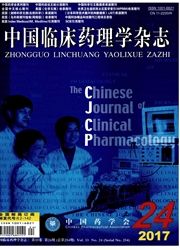

 中文摘要:
中文摘要:
目的研究急性炎症状态下大鼠肝P-糖蛋白翻译后修饰的机制。方法 20只大鼠随机分成2组,模型组10只,对照组10只。模型组予以腹腔单次注射5 mg·kg^-1脂多糖,对照组予以腹腔单次注射等体积0.9%氯化钠。24 h后,取肝组织,制备匀浆,分别用Western blot、免疫沉淀法和荧光法检测模型组和对照组的肝P-糖蛋白表达水平、P-糖蛋白泛素化水平和26S蛋白体活性的变化。结果与对照组相比,模型组肝P-糖蛋白蛋白表达水平显著降低(P〈0.01),肝P-糖蛋白泛素化水平显著升高(P〈0.01),26S蛋白体的活性显著升高(P〈0.01)。结论泛素-蛋白酶体途径参与急性炎症状态下大鼠肝P-糖蛋白的下调。
 英文摘要:
英文摘要:
Objective To explore the expression of P- glycoprotein( P- gp) in rat liver during acute inflammation( AI) and the possible mechanism involved. Methods Twenty rats were randomly divided into two groups: model group( n = 10) and control group( n = 10). The rats in model group were treated by a single 5 mg·kg^- 1intraperitoneal injection of lipopolysaccharide( LPS). Control rats received equivalent injection of sterile normal saline. The levels of P- gp,ubiquitinated P- gp and 26 S proteasome activity in both groups were analyzed by Western blot, immunoprecipitation and fluorescence detection, respectively.Results Compared to the control groups,ubiquitination levels of liver P- gp and 26 S proteasome activity in model groups were significantly increased( P〈 0. 01),accompanied by an decrease of liver P- gp protein expression level. Conclusion The participation of the ubiquitin-proteasome system in down- regulation of liver P- gp expression levels under AI conditions.
 同期刊论文项目
同期刊论文项目
 同项目期刊论文
同项目期刊论文
 期刊信息
期刊信息
